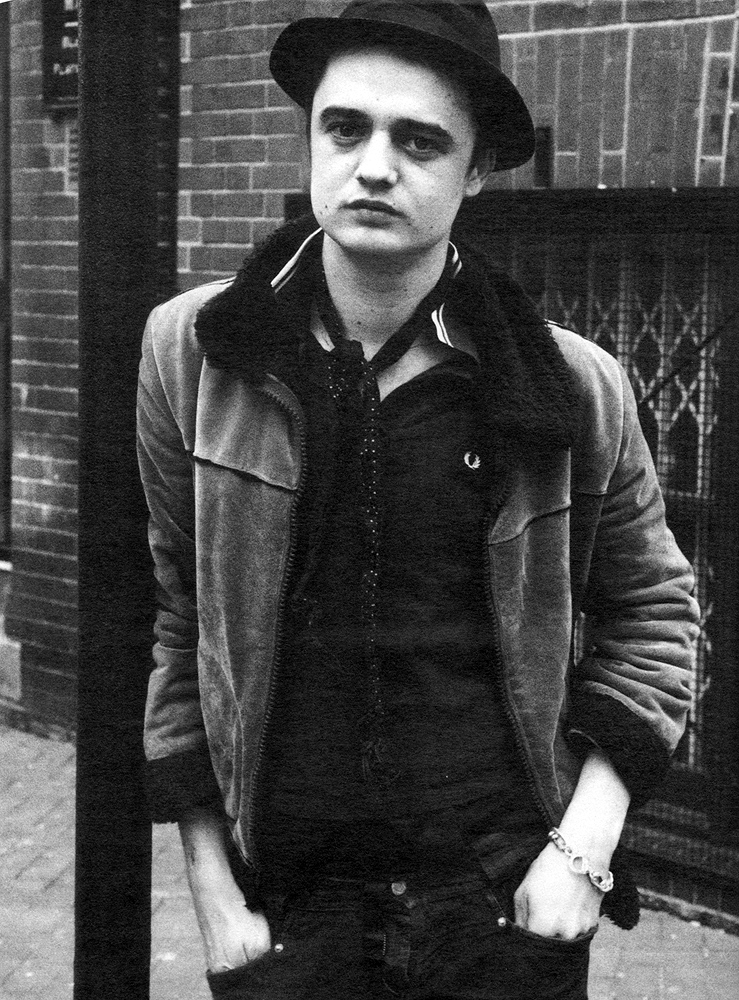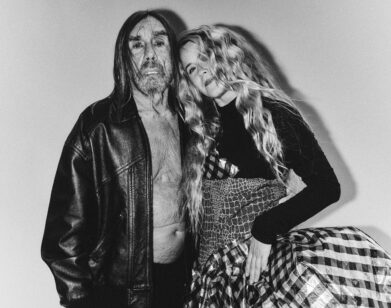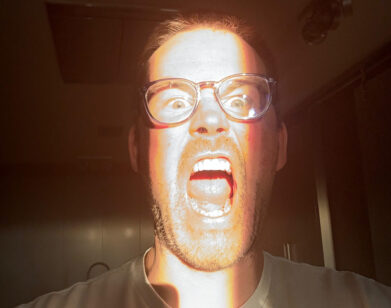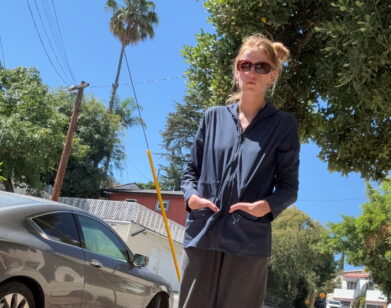New Again: Pete Doherty
Over the past two decades, Peter “Pete” Doherty has adopted many names and reputations. The musician is perhaps best known as the frontman of British indie-rock band the Libertines—a four-piece whose success in the early 2000s often put Doherty in the spotlight for the wrong reasons, including a media obsession with his drug addiction and a very public relationship with his ex-fiancée Kate Moss. When Doherty was ejected from the Libertines due to his ongoing drug use, he started a new band, Babyshambles, which released its third album in 2013. Nowadays, howevever, he’s Peter Doherty, a solo artist with one record to his name (2009’s Grace/Wasteland) and another on the way: Hamburg Demonstrations (out December 2 via BMG/Clouds Hill). Its first single, “The Whole World is Our Playground,” came out in April, and Doherty released its second track, “I Don’t Love Anyone (But You’re Not Just Anyone),” yesterday with the album announcement.
As we eagerly await the 11-track LP, we’ve reprinted Doherty’s interview from our August 2005 music issue (back when he went by “Pete”). Doherty appeared on the cover in anticipation of the release of a new record by Babyshambles. The interview is full of surprises, including an impromptu acoustic performance of the first song Doherty ever sang live, and a discussion with Ingrid Sischy’s assistant on what his boss’s handwriting is really like. — Natalia Barr
Pete Doherty: Sex (Check), Trouble (Check), Rock ‘n’ Roll (Hell, yeah!)
By Ingrid Sischy
People like Pete Doherty are the reason why generation gaps exist. Having emerged three years ago as the front man for the London-based rock band the Libertines, which he led with his friend Carl Barât, Doherty quickly became the most visible face for a group of British musicians who were raging against the success of easy-listening soft-rock bands like Coldplay, striving to make music that spoke more directly, more urgently, and more viscerally to kids sick of bopping to “Yellow” alongside their parents. Perhaps it was his unbridled energy, his adventures in pharmacology, or simply the hesitant beauty of his songwriting—which he borrows as much from the pop melodies of the Beatles as it does from the ragged verve of the Clash—but those kids selected Doherty, as other kids in other times selected Robert Johnson and Jim Morrison and Sid Vicious and Kurt Cobain and even Arthur Rimbaud before them, to be their great liberator.
Until very recently, Doherty had been doing all of this in relative obscurity—or at least in as much obscurity as someone who has done jail time for breaking into his bandmate’s flat, spouted publicly about his drug use, sparked riots with his missed gigs, and walks to the convenience store with Kate Moss at his side can do anything without getting noticed. In a culture of manufactured rock stars and groomed public faces, his untamed heart is certainly touching all the right nerves. But whether he becomes the classic songwriter that his talent would suggest or goes on to fulfill all the unfortunate clichés that seem equally within his grasp remains to be seen. At least for now, Pete Doherty is riding the fine line between the two as hard as anyone can. As he and his new band, Babyshambles, put the finishing touches on their highly anticipated new album, the group’s 26-year-old singer and principle songwriter is ready to put himself—and the myth-in-the-making that surrounds him—to the test.
INGRID SISCHY: True rock ‘n’ roll fans say you are one of the few of the new generation to be holding up the authenticity of the music. They say when they heard you they knew rock ‘n’ roll was as alive and as exciting as ever. No need for nostalgia.
PETE DOHERTY: Who said that? My manager?
SISCHY: [laughs] Of course he would. But no, I’m talking about people who have nothing to gain if you win or lose, and I’m also talking about other musicians.
DOHERTY: I don’t believe in how other people view these things. Whether it’s complimentary or even full-on proper. Do you wanna know if I believe the hype?
SISCHY: Not the hype, but do you still believe in rock ‘n’ roll?
DOHERTY: Well, I believe it exists.
SISCHY: And when did you first know it existed? When was the first time that you heard rock ‘n’ roll and you thought, Hey, this is something?
DOHERTY: Hmmm, I’ll try to get an honest answer to you … I could contrive something, but I suppose … I dunno, like, Donovan? When there’s a song, and it makes you want to sing along. That’s what you’re talking about, isn’t it? You’re talking about that magic feeling.
SISCHY: I am.
DOHERTY: It’s just a feeling. You want to dance. You want to sing. Yeah, that feeling, of course, is beyond recollection really.
SISCHY: And when was the first time that you performed in public? How old were you?
DOHERTY: I was probably about 15. I did a song called “Billy the Hamster” in a school assembly.
SISCHY: “Billy the Hamster?”
DOHERTY: It’s a good song. Do you wanna hear it?
SISCHY: Yeah, I’d love to hear it.
DOHERTY: Okay… [begins strumming guitar, singing] “When I was eight, checked on my Dad / On and on and on and on / Well I was driving him mad / He said, No, no you ain’t havin’ no pets / Oh my boy, [harmonica comes in] You just ain’t old enough yet / Woo-hoo / When I was nine, a little bit older / My birthday and dad tapped me on the shoulder / Well you can imagine my surprise / A little rodent / I call him Billy, Billy the Hamster / Well me ‘n Billy, we were the best of friends / I thought, the fun would never end / But then, one day / One day Billy died … Cryyyyyy … And I cried.” [more harmonica]
SISCHY: Awww.
DOHERTY: He got electrocuted in the song—
SISCHY: That’s heartbreaking. Tell me the difference between performing in Britain and America?
DOHERTY: Well, there’s a difference between performing in Philadelphia to New York as much as a difference between playing in Luton and playing in San Francisco, y’know what I mean?
SISCHY: You’re famous for really bringing out the feelings of your audience when you perform.
DOHERTY: It’s a lyrical endeavor. It’s just an event, a kind of molten honesty. Sort of like a volcano.
SISCHY: The thing that struck me when I first read about you is your desire to really keep a connection with the audience and break down the distance between performer and audience. Where does that come from?
DOHERTY: The same place any desire comes from: the soul. I wouldn’t say it was necessarily deliberate in the early days, but there was a point where ya have to … put the kettle across the pedal, if y’know what I mean. And, I think “Horror Show” was really the first song where I actually thought, What are the people listening to this song gonna think?
SISCHY: Do you feel a responsibility to your audience?
DOHERTY: At the moment I think that it’s almost like the audience feels they have a responsibility to me.
SISCHY: That’s interesting. Tell me more.
DOHERTY: I get a lot of lectures.
SISCHY: What about?
DOHERTY: Oh, y’know: “Are you all right?” “Yeah, I’m fine.” “No Pete, Pete, are you sure you’re all right?” “I mean, What’s gonna happen?” “I’ll be fine, I’ll be fine.”
SISCHY: It’s because they’re worried. They’re worried about the drugs. They’re worried about the run-ins with the law. They want you to stick around, because you’re one of the first in a long time to come along the rock ‘n’ roll road and be the real thing.
DOHERTY: But, yeah there’s a certain responsibility.
SISCHY: To whom? To what? To yourself? To them? To the music?
DOHERTY: To be honest, I’ve said it before, no one comes up to me asking for a crack dealer’s number. People come up to me to talk about lyrics, about music, about the band. I don’t get people coming up to me asking where they can get drugs, d’you understand?
SISCHY: Of course I do; you’re talking about the idea that because Pete the musician is so important to his fans, the other parts of Pete could influence your followers too.
DOHERTY: I’m not saying that maybe there isn’t a kid out there whose behavior hasn’t been influenced by me in some way. I’m sure there is. But I can only speak for myself, and if you’d asked if my behavior had ever been affected by people I’d admired from afar, like musicians or footballers, that’d be a yes, totally. Right down to their hand gestures.
SISCHY: So your behavior was influenced by them.
DOHERTY: Yeah. There were certain things I could romanticize about other people’s lives. I might perceive certain things and think, Well if they did it, it must be all right. Get me?
SISCHY: Give me an example.
DOHERTY: Dennis Bailey, right? He scored a hat trick on New Year’s Day in Old Trafford, right, 4-1; it’s before [British] Sky [Broadcasting] took over English football, the halcyon days you might call them, but he was a born-again Christian, and he made me turn to Genesis.
SISCHY: Jesus Christ.
DOHERTY: [laughs] Exactly.
SISCHY: He made you open the Bible?
DOHERTY: Yeah, well I’d opened it before, I mean I’d been to Sunday school and whatnot. But I wrote to him, and he wrote back saying I should read the Bible. He made me open the pages of Genesis.
SISCHY: If a kid wrote to you, what would you tell them to open?
DOHERTY: Open your heart. Don’t be spiteful.
SISCHY: Nice.
DOHERTY: Nice?
SISCHY: To say that to someone. Open your heart—that’s a great thing.
DOHERTY: Oh, you mean nice in a nice way. Nice over here is a strange word.
SISCHY: Yeah, well, we use it here a lot.
DOHERTY: My uncle Phil always says, “Nice to be nice.”
SISCHY: When you’re writing, does it feel good?
DOHERTY: Um, well, you’re a writer yourself.
SISCHY: Yes.
DOHERTY: It’s probably the same for you. When inspiration and emotions are sudden, and you can truly capture something, then, yeah, of course it feels good. But when you’re stunted, and you’re having trouble expressin’ yourself, then obviously it doesn’t. So it’s never constant.
SISCHY: But when it’s working for me, it’s the time when I feel like I’m doing what I should be.
DOHERTY: Well, that means you are doing what you’re meant to do.
SISCHY: When it’s working.
DOHERTY: God bless your ink. Do you type or do you scroll?
SISCHY: I handwrite. I always have.
DOHERTY: That’s interestin’. I admire that, actually.
SISCHY: If I wrote on a computer, it would kill the whole thing for me.
DOHERTY: Ya serious?
SISCHY: I’m dead serious.
DOHERTY: So do you have someone else to type it up?
SISCHY: I handwrite it, and for years I had a manual typewriter, but then I wrote so much that I started hurting my hands, so now I handwrite it, and I have a wonderful assistant who types it up.
DOHERTY: What’s her name?
SISCHY: It’s a guy. His name is Stephen.
DOHERTY: Is he there?
SISCHY: Yeah, he’s in the other room.
DOHERTY: Can I speak to him?
SISCHY: Sure, we’ll put him on the phone too. Hold on a sec, I’m going to get him.
STEPHEN DOUGHERTY [INGRID’S ASSISTANT]: Hello?
SISCHY: Pete, this is my assistant, Stephen.
DOHERTY: Hello. What’s Ingrid’s handwriting like? You can tell a lot about a person by their handwriting.
SISCHY: Stephen, don’t be polite, tell him the truth.
DOUGHERTY: It’s very clear and easy to read.
DOHERTY: Are you telling me the truth?
SISCHY: Stephen, that is not true! Hey, Pete and I are telling each other the truth here, so we have to keep doing that, even if it insults me. Stephen, my handwriting’s a nightmare! [Doherty laughs]
DOHERTY: See, now we’re back to square one. Stephen, I just don’t know who to trust anymore.
DOUGHERTY: [laughs] With a little practice it becomes easy to read—is what I meant to say. [laughs again] It’s… Interesting.
DOHERTY: It’s interesting. Would she make a good doctor?
DOUGHERTY: Yeah, a very, very good doctor.
DOHERTY: Ingrid, in other words, your handwriting is completely illegible.
SISCHY: Now we’re talking! My handwriting’s a nightmare. Once you’re in the world of it, it’s okay. But it takes time to get there.
DOHERTY: Well, that’s funny because I’ve kinda almost stepped into a parallel there in my lyrics. Once you realize that what I’m saying is true and comes from the heart, then it’s easy. But if you see it all as a façade and just a presentation of affected emotion, then it’s not so easy, it’ll just confuse you. You wonder why someone would make up such things.
SISCHY: That’s right. To me, anything that I’ve ever looked at or listened to that matters is because it takes you into someone’s world. And once you go through the door, you’re there.
DOHERTY: Yeah—through the looking glass.
SISCHY: That’s right. So, now your music’s getting better and better known. Then there’s the rest of your life, including your romance with Miss Moss. You’re becoming a bigger and bigger icon. Is that a good thing?
DOHERTY: Some days. I mean, take today for example. I stepped out the door, and this white van pulled up, yeah? And this fella shouted out, “Pete, Pete, Pete, oy, Pete! And, yeah, mate … it’s great to meet you. Listen, uh, it’s a bit cheeky, but my son, he’s a great fan of yours. D’you reckon you can phone ‘em up?” So they give me the phone and dial his son’s number, and his son answered, and I said, “Hello?” And he said, “Hello?” I said, “Yeah, um, is that Ian?” He said, “Yeah.” I said, “Listen, your dad just put me on the phone with you.” He said, “Who is that?” I said, “Pete Doherty.” He said, “What do you want?” And that was that. But the point is, mix your drinks, and it’s best not to cry over spilt milk, but put it back in the bottle.
THIS INTERVIEW ORIGINALLY APPEARED IN THE AUGUST 2005 ISSUE OF INTERVIEW.







